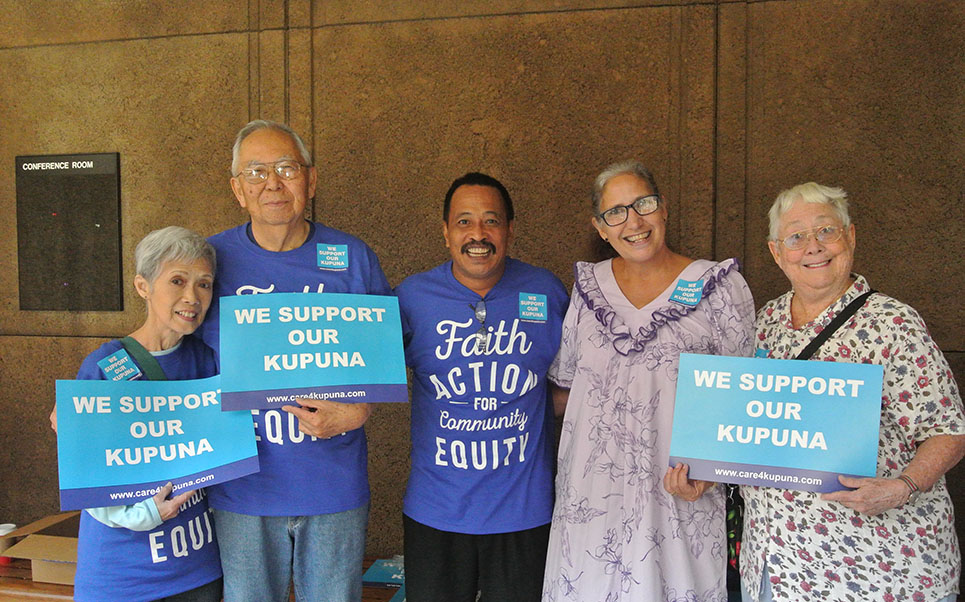We are proud to announce the launch of the CREATIVE CARE COUNCIL! LEARN MORE
We are proud to announce the launch of the CREATIVE CARE COUNCIL! LEARN MORE

Early in the morning on January 21, Caring Across Generations staff and volunteers arrived at the deserted State Capitol building in Honolulu, Hawaiʻi. By 9:00 AM, the room was packed to the point of overflow with reporters, lawmakers, and citizens, all waiting to hear a press conference and briefing on a historic piece of legislation: Hawaiʻi’s statewide long-term care social insurance plan.
The plan, introduced by Senator Roz Baker, would be the first in the nation to provide universal long-term care benefits to seniors and people with disabilities. If passed, the plan would serve as a model for the rest of the United States for how to approach the mounting care crisis.
This wealth of support comes as no surprise to us: Hawaiʻi is in a unique position when it comes to its aging population. Hawaiʻi’s population is aging more rapidly than the national average and its seniors live longer than seniors in any mainland state. While the population of seniors 75 and older increased nationally by 47% since 1990, the same population in Hawaiʻi increased by 116%. Hawaiʻi is also one of the most expensive states for retirement in the nation.
Clementina Ceria-Ulep, professor and co-chair of the Faith Action for Community Equity (FACE) Long-term Care Task Force, said of Hawaiʻi: “No other state is as far along or has invested so much time and research in conducting the analysis of the funding mechanism that could adequately support a insurance program for long term care.”
The plan would provide $70 per day for up to 365 days for families to go towards the long-term care of a loved one, raised through a 0.5% increase in the state’s General Excise Tax. The bill would revolutionize care in Hawaiʻi, where the cost of long-term care is estimated to be $10,000 per month.
There are an estimated 154,000 unpaid caregivers in Hawaiʻi. Darlene Rodriquez, a family caregiver who gave up her job to be able to care for her mother, said at the press conference: “This time with my mother is a gift…but it is a gift that comes with a tremendous burden.” She went on to say that she doesn’t feel as if society cares about caregivers or their kupuna (honored elders).
If passed, this bill would help change all that. Building on Hawaiʻi’s legacy of “care for kupuna,” the bill aims to keep seniors living in their own homes as long as possible by providing support to both seniors and their families. The per diem would allow family caregivers to bring in extra help, pay for respite care as needed, and have more flexibility with their own jobs.
Next up? Caregivers, kupuna and their families, and FACE members are headed back to the Capitol on Wednesday, February 10, to show their support at a hearing of the bill. The joint hearing of SB 2478 will take place in front of the Senate Committee on Commerce, Consumer Protection and Health and the Senate Human Services Committee. If the committee approves the bill, it will give this legislation a huge boost.
Senator Baker said it best: “Our senior population and the need for care continue to grow here, and ninety percent of people want to be cared for at home. We have to get to a solution that helps families take care of their loved ones without going bankrupt. It is the right thing to do for our kupuna and for our family caregivers.”
Check out the press coverage we have received to date, and stay tuned for information from this upcoming hearing.
Hawaiʻi Is About To Debate A Public Long-Term Care Insurance Program, Forbes.
Hawaiʻi Long-Term Health-Care Bill Serves as National Model, The American Prospect.
Hawaiʻi could be first to start long-term care elderly benefit, Honolulu Star-Advertiser.
Would You Pay More In Taxes To Take Care Of Mom?, Honolulu Civil Beat.
Baker plans another try at universal long-term care for Hawaiʻi seniors, Pacific Business News.